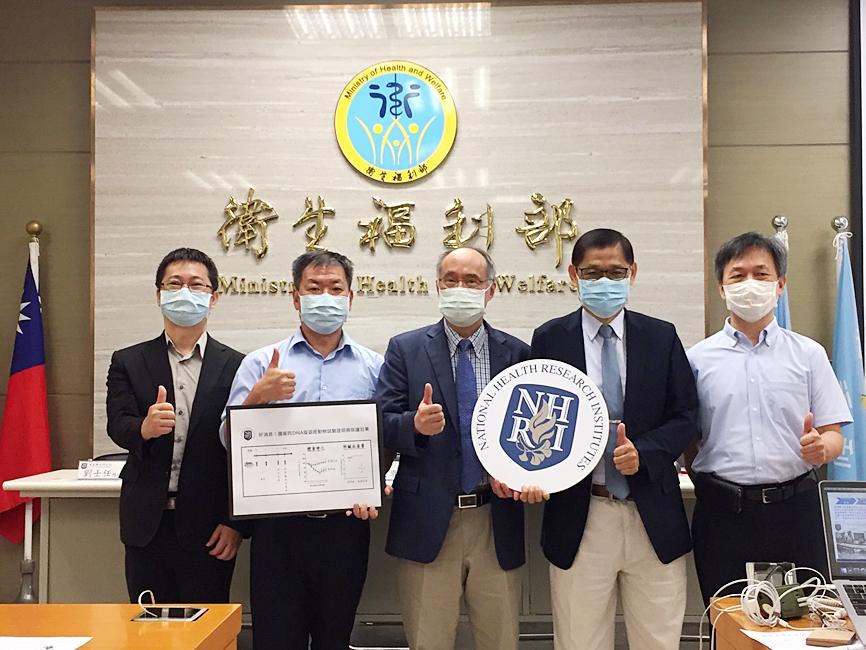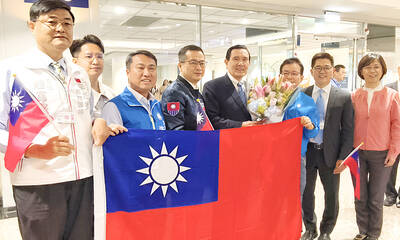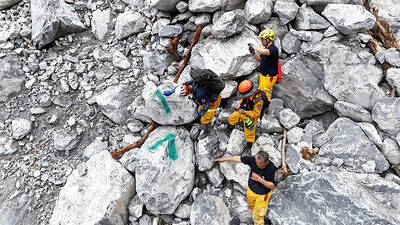The National Health Research Institutes (NHRI) yesterday said that tests of its DNA vaccine against COVID-19 on hamsters was promising, with clinical trials likely to start later this year.
The institute on July 1 chose the DNA vaccine among its four vaccine development platforms as its main focus and started animal testing, Institute of Infectious Diseases and Vaccinology director Liao Ching-len (廖經倫) said.
“The vaccine has shown the effect of significantly reducing the viral load and decreasing the damage that the virus caused to the lungs” of hamsters, he said.

Photo: Wu Liang-yi, Taipei Times
“With the DNA vaccine, we deliver genetic information [a plasmid containing the DNA sequence encoding the antigens against COVID-19] into the human body, and when it enters the cells, the cells produce spike proteins,” Liao said.
He said it is similar to the actual situation of when someone is infected by the virus, stimulating the body’s immune response.
In animal testing, the vaccine successfully stimulated the production of neutralizing antibodies, blocking the viral infection, he said.
Hamsters that did not receive the vaccine lost weight and general vitality, and their viral load remained high, while those that received the vaccine did not lose much weight or vitality and their viral load dropped significantly to 1 percent of the original volume, Liao said.
He said the research team was “amazed” at the results of animal testing.
“We hope the experiments can proceed to the first phase of a clinical trial in the fourth quarter this year, finish the third phase of the clinical trial by the third quarter next year, and hit the market as soon as possible,” he said.

Former president Ma Ying-jeou’s (馬英九) mention of Taiwan’s official name during a meeting with Chinese President Xi Jinping (習近平) on Wednesday was likely a deliberate political play, academics said. “As I see it, it was intentional,” National Chengchi University Graduate Institute of East Asian Studies professor Wang Hsin-hsien (王信賢) said of Ma’s initial use of the “Republic of China” (ROC) to refer to the wider concept of “the Chinese nation.” Ma quickly corrected himself, and his office later described his use of the two similar-sounding yet politically distinct terms as “purely a gaffe.” Given Ma was reading from a script, the supposed slipup

Former Czech Republic-based Taiwanese researcher Cheng Yu-chin (鄭宇欽) has been sentenced to seven years in prison on espionage-related charges, China’s Ministry of State Security announced yesterday. China said Cheng was a spy for Taiwan who “masqueraded as a professor” and that he was previously an assistant to former Cabinet secretary-general Cho Jung-tai (卓榮泰). President-elect William Lai (賴清德) on Wednesday last week announced Cho would be his premier when Lai is inaugurated next month. Today is China’s “National Security Education Day.” The Chinese ministry yesterday released a video online showing arrests over the past 10 years of people alleged to be

THE HAWAII FACTOR: While a 1965 opinion said an attack on Hawaii would not trigger Article 5, the text of the treaty suggests the state is covered, the report says NATO could be drawn into a conflict in the Taiwan Strait if Chinese forces attacked the US mainland or Hawaii, a NATO Defense College report published on Monday says. The report, written by James Lee, an assistant research fellow at Academia Sinica’s Institute of European and American Studies, states that under certain conditions a Taiwan contingency could trigger Article 5 of NATO, under which an attack against any member of the alliance is considered an attack against all members, necessitating a response. Article 6 of the North Atlantic Treaty specifies that an armed attack in the territory of any member in Europe,

The bodies of two individuals were recovered and three additional bodies were discovered on the Shakadang Trail (砂卡礑) in Taroko National Park, eight days after the devastating earthquake in Hualien County, search-and-rescue personnel said. The rescuers reported that they retrieved the bodies of a man and a girl, suspected to be the father and daughter from the Yu (游) family, 500m from the entrance of the trail on Wednesday. The rescue team added that despite the discovery of the two bodies on Friday last week, they had been unable to retrieve them until Wednesday due to the heavy equipment needed to lift